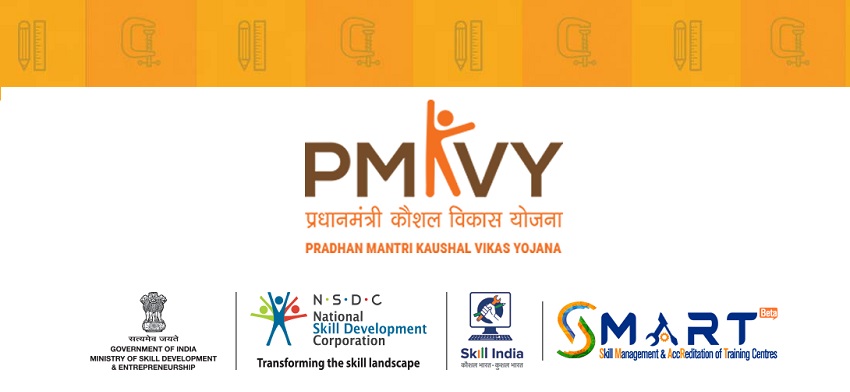Pradhan Mantri Kaushal Vikas Yojana (PMKVY) is the flagship scheme of the Ministry of Skill Development & Entrepreneurship (MSDE).
The objective of this Skill Certification Scheme is to enable a large number of Indian youth to take up industry-relevant skill training that will help them in securing a better livelihood.
Individuals with prior learning experience or skills will also be assessed and certified under Recognition of Prior Learning (RPL). Under this Scheme, Training and Assessment fees are completely paid by the Government.
Key Components of the Scheme:
1. Short Term Training
The Short Term Training imparted at PMKVY Training Centres (TCs) is expected to benefit candidates of Indian nationality who are either school/college dropouts or unemployed. Apart from providing training according to the National Skills Qualification Framework (NSQF), TCs shall also impart training in Soft Skills, Entrepreneurship, Financial and Digital Literacy. Duration of the training varies per job role, ranging between 150 and 300 hours. Upon successful completion of their assessment, candidates shall be provided placement assistance by Training Partners (TPs). Under PMKVY, the entire training and assessment fees are paid by the Government. Payouts shall be provided to the TPs in alignment with the Common Norms. Trainings imparted under the Short Term Training component of the Scheme shall be NSQF Level 5 and below.
2. Recognition of Prior Learning
Individuals with prior learning experience or skills shall be assessed and certified under the Recognition of Prior Learning (RPL) component of the Scheme. RPL aims to align the competencies of the unregulated workforce of the country to the NSQF. Project Implementing Agencies (PIAs), such as Sector Skill Councils (SSCs) or any other agencies designated by MSDE/NSDC, shall be incentivized to implement RPL projects in any of the three Project Types (RPL Camps, RPL at Employers Premises and RPL centres). To address knowledge gaps, PIAs may offer Bridge Courses to RPL candidates.
3. Special Projects
The Special Projects component of PMKVY envisages the creation of a platform that will facilitate trainings in special areas and/or premises of Government bodies, Corporates or Industry bodies, and trainings in special job roles not defined under the available Qualification Packs (QPs)/National Occupational Standards (NOSs). Special Projects are projects that require some deviation from the terms and conditions of Short Term Training under PMKVY for any stakeholder. A proposing stakeholder can be either Government Institutions of Central and State Government(s)/Autonomous Body/Statutory Body or any other equivalent body or corporates who desire to provide training to candidates.
4. Kaushal and Rozgar Mela
Social and community mobilisation is extremely critical for the success of PMKVY. Active participation of the community ensures transparency and accountability, and helps in leveraging the cumulative knowledge of the community for better functioning. In line with this, PMKVY assigns special importance to the involvement of the target beneficiaries through a defined mobilisation process. TPs shall conduct Kaushal and Rozgar Melas every six months with press/media coverage; they are also required to participate actively in National Career Service Melas and on-ground activities.
5. Placement Guidelines
PMKVY envisages to link the aptitude, aspiration, and knowledge of the skilled workforce it creates with employment opportunities and demands in the market. Every effort thereby needs to be made by the PMKVY TCs to provide placement opportunities to candidates, trained and certified under the Scheme. TPs shall also provide support to entrepreneurship development.
6. Monitoring Guidelines
To ensure that high standards of quality are maintained by PMKVY TCs, NSDC and empaneled Inspection Agencies shall use various methodologies, such as self-audit reporting, call validations, surprise visits, and monitoring through the Skills Development ManagementSystem (SDMS). These methodologies shall be enhanced with the engagement of latest technologies.
The scheme will be implemented through the National Skill Development Corporation (NSDC).



